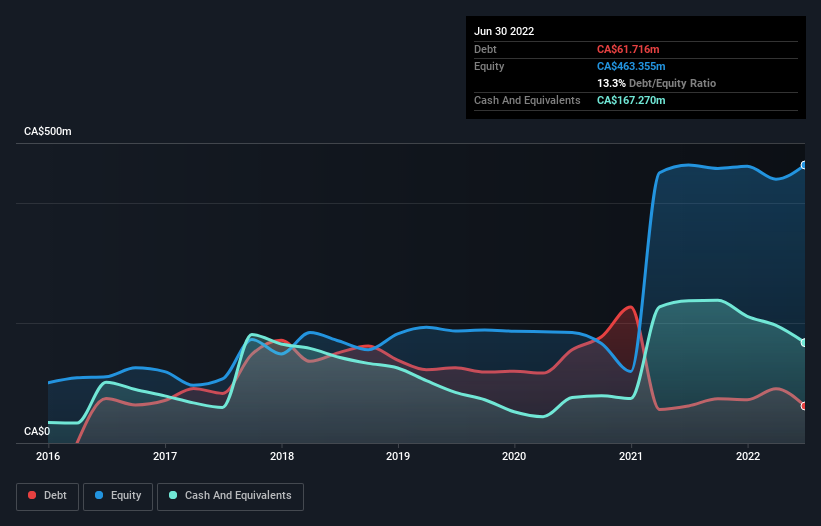Howard Marks put it nicely when he said that, rather than worrying about share price volatility, 'The possibility of permanent loss is the risk I worry about... and every practical investor I know worries about.' It's only natural to consider a company's balance sheet when you examine how risky it is, since debt is often involved when a business collapses. Importantly, NexGen Energy Ltd. (TSE:NXE) does carry debt. But the real question is whether this debt is making the company risky.
When Is Debt Dangerous?
Debt and other liabilities become risky for a business when it cannot easily fulfill those obligations, either with free cash flow or by raising capital at an attractive price. In the worst case scenario, a company can go bankrupt if it cannot pay its creditors. However, a more common (but still painful) scenario is that it has to raise new equity capital at a low price, thus permanently diluting shareholders. Of course, the upside of debt is that it often represents cheap capital, especially when it replaces dilution in a company with the ability to reinvest at high rates of return. The first step when considering a company's debt levels is to consider its cash and debt together.
Our analysis indicates that NXE is potentially overvalued!
What Is NexGen Energy's Net Debt?
The chart below, which you can click on for greater detail, shows that NexGen Energy had CA$61.7m in debt in June 2022; about the same as the year before. But it also has CA$167.3m in cash to offset that, meaning it has CA$105.6m net cash.

A Look At NexGen Energy's Liabilities
We can see from the most recent balance sheet that NexGen Energy had liabilities of CA$13.5m falling due within a year, and liabilities of CA$65.4m due beyond that. Offsetting this, it had CA$167.3m in cash and CA$862.0k in receivables that were due within 12 months. So it can boast CA$89.3m more liquid assets than total liabilities.
This surplus suggests that NexGen Energy has a conservative balance sheet, and could probably eliminate its debt without much difficulty. Succinctly put, NexGen Energy boasts net cash, so it's fair to say it does not have a heavy debt load! The balance sheet is clearly the area to focus on when you are analysing debt. But ultimately the future profitability of the business will decide if NexGen Energy can strengthen its balance sheet over time. So if you want to see what the professionals think, you might find this free report on analyst profit forecasts to be interesting.
Since NexGen Energy doesn't have significant operating revenue, shareholders must hope it'll sell some fossil fuels, before it runs out of money.
So How Risky Is NexGen Energy?
We have no doubt that loss making companies are, in general, riskier than profitable ones. And in the last year NexGen Energy had an earnings before interest and tax (EBIT) loss, truth be told. And over the same period it saw negative free cash outflow of CA$84m and booked a CA$46m accounting loss. Given it only has net cash of CA$105.6m, the company may need to raise more capital if it doesn't reach break-even soon. Overall, its balance sheet doesn't seem overly risky, at the moment, but we're always cautious until we see the positive free cash flow. There's no doubt that we learn most about debt from the balance sheet. However, not all investment risk resides within the balance sheet - far from it. We've identified 2 warning signs with NexGen Energy (at least 1 which is a bit unpleasant) , and understanding them should be part of your investment process.
When all is said and done, sometimes its easier to focus on companies that don't even need debt. Readers can access a list of growth stocks with zero net debt 100% free, right now.
Valuation is complex, but we're here to simplify it.
Discover if NexGen Energy might be undervalued or overvalued with our detailed analysis, featuring fair value estimates, potential risks, dividends, insider trades, and its financial condition.
Access Free AnalysisHave feedback on this article? Concerned about the content? Get in touch with us directly. Alternatively, email editorial-team (at) simplywallst.com.
This article by Simply Wall St is general in nature. We provide commentary based on historical data and analyst forecasts only using an unbiased methodology and our articles are not intended to be financial advice. It does not constitute a recommendation to buy or sell any stock, and does not take account of your objectives, or your financial situation. We aim to bring you long-term focused analysis driven by fundamental data. Note that our analysis may not factor in the latest price-sensitive company announcements or qualitative material. Simply Wall St has no position in any stocks mentioned.
About TSX:NXE
NexGen Energy
An exploration and development stage company, engages in the acquisition, exploration, evaluation, and development of uranium properties in Canada.
Excellent balance sheet with slight risk.
Similar Companies
Market Insights
Weekly Picks

Solutions by stc: 34% Upside in Saudi's Digital Transformation Leader


The AI Infrastructure Giant Grows Into Its Valuation
Recently Updated Narratives


Engineered for Stability. Positioned for Growth.


MINISO's fair value is projected at 26.69 with an anticipated PE ratio shift of 20x


Fiverr International will transform the freelance industry with AI-powered growth
Popular Narratives


MicroVision will explode future revenue by 380.37% with a vision towards success


NVDA: Expanding AI Demand Will Drive Major Data Center Investments Through 2026



